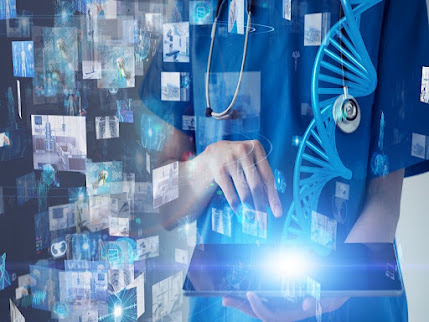AI, or Artificial Intelligence, in healthcare, refers to the application of sophisticated computer algorithms and models to perform tasks that typically require human intelligence. These AI systems are designed to analyze, interpret, and process immense quantities of healthcare data in order to assist with medical diagnosis, treatment planning, drug discovery, personalized medicine, patient monitoring, and administrative tasks. The integration of AI in healthcare has the potential to transform the industry and enhance patient outcomes in multiple ways:
Medical Imaging and Diagnostics: AI-powered algorithms can analyze medical images, such as X-rays, CT scans, and MRIs, to aid radiologists and other clinicians in detecting abnormalities, tumors, or diseases with greater precision and efficiency.
Predictive Analytics: Artificial intelligence (AI) algorithms can process patient data from electronic health records (EHRs) and other sources to predict prospective health risks, disease progression, and treatment responses, allowing for early interventions and personalized treatment.
Drug Discovery: AI can expedite drug discovery by analyzing enormous databases of molecular structures, simulating drug interactions, and identifying potential drug candidates for specific diseases.
Personalized Medicine: AI can assist in identifying individual patient characteristics, genetic factors, and environmental influences in order to tailor the most effective treatment plans for each patient, resulting in improved outcomes and fewer adverse effects.
Virtual Health Assistants: Virtual assistants powered by artificial intelligence can provide patients with personalized health information, respond to basic medical inquiries, and aid in medication management and appointment scheduling.
Remote Patient Monitoring: AI-enabled devices and sensors can continuously monitor patients' health status and notify healthcare providers of any concerning changes, enabling proactive interventions and decreasing hospital readmissions.
Administrative Efficiency: Artificial intelligence can expedite administrative tasks such as billing, coding, and scheduling, resulting in reduced administrative burdens for healthcare professionals and cost savings for healthcare organizations.
Medical Research: Artificial intelligence can analyze and interpret large-scale research data, scientific literature, and clinical trials, assisting researchers in the identification of patterns, potential treatment options, and areas for further study.
Prediction of Disease Outbreaks: Artificial intelligence can analyze data from various sources, such as social media and internet searches, to predict and monitor disease outbreaks, allowing for opportune public health interventions.
While AI bears great promise in healthcare, it also presents challenges related to data security, privacy, and ethics. Ensure that patient data is appropriately protected and that AI algorithms are transparent, unbiased, and accountable, as these are crucial factors for the responsible implementation of AI in the healthcare industry. AI has the potential to revolutionize healthcare, enhance patient outcomes, and make healthcare services more accessible and efficient if it continues to advance and is deployed responsibly.
Read other:
https://melvinasmarketblogs.blogspot.com/2023/07/explain-augmented-reality-ar-and.html
https://timesofrising.com/macbook-rumors-2023-success/
https://animemuzz.com/macbook-rumors-2023/
https://bizopzone.com/latest-features-and-price-of-macbook-rumors-2023/
https://playstoreapk.com/macbook-rumors-2023/
https://mywebsnews.com/macbook-rumors-2023/
https://www.iktix.com/macbook-rumors-2023/
https://www.addonface.com/read-blog/14858
https://darazseller.online/macbook-rumors-2023/
https://belimes.com/macbook-rumors-2023/
https://mirroreternally.com/macbook-rumors-2023/
https://nutrahouse.com/macbook-rumors-2023/
https://writewisepost.com/macbook-rumors-2023/

Comments
Post a Comment